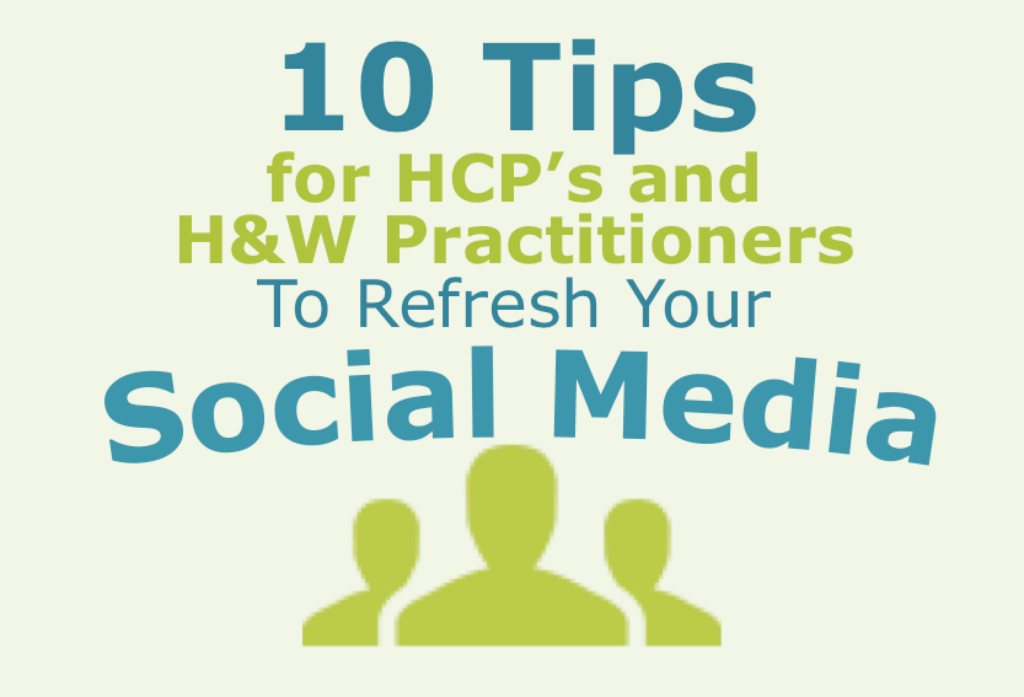Are you one of those people who thought social media was a waste of time but are now reconsidering? Wondering how to get started or revamp your online profiles? It is not too late.
Most healthcare professionals (HCPs) have been wary of using social media to build their professional practice or to communicate with their patients. Wellness practitioners, such as Health Coaches, are generally more progressive in their use of social. Today there is a lot more to gain for a practitioner. The fact is that consumers use social media and online resources to access information about their health. Social media is now an efficient and credible channel for HCPs and wellness practitioners to build awareness of their professional credentials, practice, and/or service offerings, connect with others in their field, or promote their professional activities to prospective patients or partners.
10 Quick Tips for Leveraging Social Media
Here are our top tips for either getting started with social or taking a fresh look at your approach:
1. Show Up
If you haven’t already, create a profile for your practice on the social media networks where you can best reach your patients or clients. If you have social accounts but have not been active, consider using these accounts to tell your audience what you are all about. People who visit your social profiles will only see your most recent posts, so it is not too late to get started or try a different approach.
2. Set Goals
It is important to think about what you want social media to help you accomplish, such as attracting new patients, building your professional brand, or growing and monetizing a follower base. Focus your messaging on a target audience that can help you accomplish this goal. For example, if you want to generate referrals, set up your Facebook, Instagram and/or TikTok page with this in mind as you write your bio, select images, and curate your content. Include information that enhances your credibility among prospective patients, existing patients, or practitioners in a complementary field.
3. Listen
Take a look at social profiles of other professionals you trust and admire for inspiration. Check back frequently. See what kind of content generates engagement (likes, shares, comments) from the audience you are trying to reach.
4. Find Your Voice
Create content that is relevant to your specific skills and the services you provide. Consider what kind of information and perspectives will provide added value to your audience. Remember that social media is just another way to build a relationship with people, so be human and real. No need to take yourself too seriously all of the time.
5. Engage
Post content you believe will resonate with your target audience, deliver health + wellness concepts in an easy to understand manner, and will get attention. Try different approaches, different content formats and lengths to see what generates the reaction you are hoping for. Learn from others who are similar to you. Follow others you know in similar or complementary fields and share and comment on posts that you believe have value for your audience.
6. Be Responsive and Positive
You may get questions and feedback from followers on your social media accounts. Be responsive to questions and requests. Monitor your social media handles for mentions on Google alerts or other social listening tools so that you are notified when there is a comment about you or your business. Respond to comments publically in a positive manner. Thank them for their compliments. Be open to understanding their perspective and how you can improve your experience for them. Stay positive, even when you disagree with a comment. Be respectful and acknowledge different points of view. Shut down negative comments or posts about a bad experience by suggesting the person get in touch with you via direct message, phone, or email to resolve any issues.
7. Give Credit
If you are sharing any third party information such research results or other facts, be sure to credit your sources. Posting trademarked or copyrighted information is not allowed without crediting the source. Including a link to a source is appropriate, and generally appreciated by the author.
8. Fact-check
It is a good idea to fact-check material before you share it. Even if you are sharing information from a credible source, avoid embarrassment by double checking the sources of key facts, stats and quotes from experts.
9. Be Professional, But Human
When it comes to personal vs. professional information, I believe there is a balance to strike. Make sure you are not disclosing any confidential patient information. If you are a healthcare professional, disclose in your bio that your content is not to be considered medical advice. Avoid sharing information that is overly personal. However, you are a human being and your followers will appreciate this. If you work in pediatrics and are also a parent, your personal experiences can be invaluable to your audience. If you are a fitness professional and have also suffered an injury or experienced weight gain, your audience may really appreciate hearing a bit about how you pulled through.
10. Disclose Paid Endorsements or Partnerships
Be authentic and transparent about relationships with brands or entities. If you are being compensated in some way by a company for talking about a product, creating content or providing some other marketing services, FTC guidelines require that this is disclosed. One way that we can do that is with the various hashtags (e.g., #ad, #sponsored) set up on each platform to show that something has been sponsored, or that a business relationship exists between the influencer and the brand.
For full details on the FTC guidelines for Social Media Influencers, check out their publication, Disclosures 101 for Social Media Influencers.
